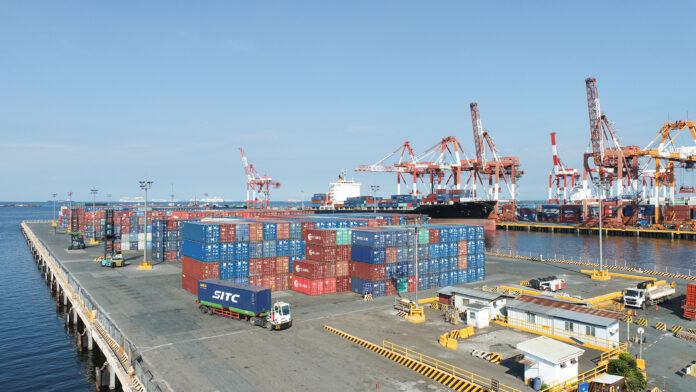-
The Philippine Ports Authority, Bureau of Customs and terminal operators said there will be no disruption in port operations during the two-week enhanced community quarantine in Metro Manila from August 6 to 20
-
PPA described ports operating during ECQ as “nothing new”
-
International Container Terminal Services, Inc said importers and authorities have established good processes to ensure shipments move along well
-
Asian Terminals Inc said it institutionalized safety initiatives as early as last year to ensure a COVID-19-resilient port environment
There will be no disruption in port operations when Metro Manila goes into a two-week enhanced community quarantine (ECQ) starting August 6, assured the Philippine Ports Authority (PPA), Bureau of Customs (BOC) and terminal operators.
Metro Manila will be under ECQ, the strictest form of lockdown, from August 6 to 20 amid local transmission of the highly infectious COVID-19 Delta variant in the country.
BOC said there will be no disruption in operations even as some personnel work from home in shifts in compliance with Inter-Agency Task Force for the Management of Emerging Infectious Diseases guidelines. BOC Public Information and Assistance Division chief Bienvenido Datuin, Jr. in a text message noted most BOC processes and transactions are already conducted online.
PPA assistant general manager for operations Hector Miole, in text messages to PortCalls, described as “nothing new” ports operating during ECQ.
“We have been tested last year and except for initial disruption that occurred then, the port remained open and have been able to manage traffic coming in and going out,” he added.
Manila International Container Terminal operator International Container Terminal Services, Inc. executive vice president Christian Gonzalez told PortCalls in an email: “If this last ECQ in April 2021 is anything to go by, both importers and the authorities have established good processes to keep things moving well so there won’t be any issues.”
He added, however, “there could be pressure on reefers” due to “long staying pork containers” inside the terminal from the last few months.
Government recently approved higher imports of pork to plug the supply gap due to the African Swine Fever that affected many areas.
READ: Import guidelines for more pork shipments get nod
Asked if he hopes owners of long-staying reefer cargoes would take advantage of the two-week ECQ to withdraw their shipments, Gonzalez said: “Nobody wants food products sitting anywhere regardless of where it is in the supply chain so ECQ or not, reefers should be pulled out. That’s what the JAO continues to enforce.”
READ: JAO fast tracks release of cargoes to address port congestion
Gonzalez is referring to JAO 20-01, which provides processes to expedite release of refrigerated containers and dry cargoes from the ports during ECQ. The JAO was signed in April 2020 to prevent port congestion following ECQ-related restrictions.
In a separate statement, Asian Terminals Inc. (ATI) said Manila South Harbor along with Batangas Container Terminal (BCT) will remain operational during the new round of ECQ while following stringent industrial health and safety protocols prescribed by local and international COVID-19 experts to keep the supply chain moving.
“As a trade enabler, our ports will remain business as usual during this heightened quarantine classification in the NCR Plus to ensure the unhampered flow of food, medical supplies, consumer goods and other vital necessities in support of the economy,” ATI executive vice president William Khoury said.
He added that port transactions such as settling port fees, container bookings and other inquiries are now done online through ATI’s e-portal facilities for faster and safer contactless interactions.
“Port authorities in Manila and Batangas are also on ready status to process cargoes, so we encourage customers to facilitate their shipments to avoid any inconveniences or unnecessary volume buildups,” Khoury said.
“We enjoin other segments of the supply chain to do the same, following the guidelines set forth by authorities, to ensure seamless and uninterrupted trade cycles.”
Apart from Manila and Batangas ports, ATI operates four inland logistics terminals in Manila and Laguna with a combined static capacity of nearly 12,000 twenty-foot equivalent units, which the port operator said have been instrumental in maintaining optimal yard utilization rates in Manila South Harbor and BCT at below 60%.
Khoury added ATI has also institutionalized and invested in significant safety initiatives as early as last year, such as onsite and nearby lodging for operations staff, dedicated home-to-office shuttles for office personnel, disinfection and sanitation devices, and in-house emergency healthcare facilities, on top of prescribed safety protocols among others, to ensure a COVID-19-resilient port environment.
Under the IATF omnibus guidelines, movement of all types of cargoes via land, air, and sea should remain unhampered within and across areas placed under any form of community quarantine. Likewise, workers in the logistics sector, such as those in cargo, trucking, courier delivery and port operations, should be allowed to transit within and across these areas.
The Department of the Interior and Local Government in a separate statement said it has reminded the Philippine National Police to allow free movement of cargo/delivery vehicles, especially those carrying food items, across all quarantine control points to be set up inside Metro Manila during the ECQ period.
The truck ban in Metro Manila will also be temporarily suspended during the ECQ period to ensure unhampered movement of essential goods, according to the Metropolitan Manila Development Authority. The number coding scheme also remains suspended, except in Makati City. – Roumina Pablo





